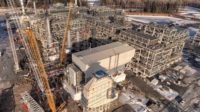After Bottom-Line Hits, More Firms Exit Fixed-Price Work

Big fixed-price contracts have proven to be a source of trouble and risk for several contractors. Graphic: Scott Hilling for ENR
Three large, publicly held contractors—SNC-Lavalin Group Inc., Fluor Corp. and Granite Construction Inc.—are exiting fixed-price contracting as a business-growth strategy in the wake of megaproject risk imbalance, the companies said in disclosing their second quarter results.
After announcing a $1.6-billion quarter loss on Aug. 1 compared to a $62.7-million profit a year earlier, Canada design-builder SNC-Lavalin said it will not bid on future “lump-sum turnkey” projects and will reorganize its infrastructure, oil-and-gas and mining units into separate businesses. The firm also has exited from at least four large Canada infrastructure project bids, for which the firm or its team shortlisted, including two in Vancouver.
Fixed-price contracts are the “root cause … of performance issues,” said interim CEO Ian Edwards in detailing the firm's current issues. “The current model within our industry is broken.”
Meanwhile observers speculate on big project impacts of fewer bidders. SNC-Lavalin's "sudden move to withdraw its bid on a $500-million overhaul of Montreal’s Lafontaine tunnel sent the government back to square one only months before work was set to begin," said Canada's Globe & Mail newspaper in an Aug. 6 opinion. "Without a Quebec-based consortium in the running, the province could be in the politically tricky situation of paying a foreign bidder substantially more on the project."
Path Forward
On Sept. 24, Fluor will detail a path forward for its previously announced retreat from fixed-price work after a strategic review led it to take a $714-million pretax second-quarter charge on Aug. 1. The Texas-based global EPC giant posted a $555-million quarter net loss compared with net earnings of $115 million a year ago. Revenue fell 16% to $4.09 billion.
“We understand the implications of the magnitude of these results,” said newly named CEO Carlos Hernandez, charged with assessing levels of risk in the firm’s backlog.
“While charges were expected, the magnitude and pervasiveness across the portfolio were worse than [Wall Street] expected,” said Jamie Cook, Credit Suisse managing director and industry sector analyst.
Fluor still will pursue fixed-price work in energy and chemicals, where there is a limited bid slate and it has identified a quantifiable advantage over other bidder, it said
It will no longer pursue lump-sum-projects government work and will replace two directors to “deepen oversight,” said Andrew Wittman, Baird Equity Research analyst. He also noted reviews of the firm’s real estate portfolio and performance of assets such as its NuScale small modular nuclear unit.
Analysts said Fluor could gain a strong share of pending LNG construction awards, with its $35-billion backlog rising to $40 billion by year end, “assuming [it] appropriately de-risks it,” said Cook.
A report last month in Weapons Complex Monitor, a government-defense services-sector publication, cited unidentified sources who said Jacobs Engineering was exploring possible purchase of Fluor’s government services group, or even the company, to further boost its federal waste-cleanup work.
Hernandez did not address the speculation in the analyst call. He said Fluor is "evaluating the rest of our organizations to see what offerings in our end markets are not consistent with our goals to drive long-term value for our shareholders. All options are on the table."
Further update will come in the Sept. 24 review announcement.
A Jacobs spokeswoman did not comment.
Jacobs said in the release Aug. 5 of its third-quarter results, that revenue and share earnings both rose. The firm is finalizing a sale of its energy, chemicals and mining group to WorleyParsons as it transitions to a services-focused model.
Risk Revisited
In reporting its $97.8-million Q2 loss on Aug. 2, Granite noted charges related to four $1-billion-plus legacy fixed-price projects in its heavy civil group that the firm and owners are disputing.
“It is now clear that, especially in the context of these megaprojects, the fixed-price design-build contract delivery model and public-private partnership … model resulted in an untenable imbalance in risk-sharing,” said CEO James H. Roberts.
He noted an accelerated review “of how we approach larger projects in our portfolio” but said results were “solid” in other units, including water, since its 2018 purchase of Layne Christensen, with a “robust project pipeline ahead for 2019.”
Noting an earlier fixed-price and P3 concession model pullout by Skanska, Mario Angastiniotis, director of Canada infrastructure and project finance for Fitch Ratings Inc., says in an Aug. 6 commentary that "many contractors expressed similar concerns that in the effort to achieve 'value for money' and maximize profits, government counter parties and equity sponsors are pushing too many risks down to the contractors, resulting in fixed-price projects becoming unprofitable."
He contends that "recent developments also reinforce our view that construction completion remains one of the most important risks posed to a project, which needs to be fully evaluated and priced appropriately," adding that key risks such as geotechnical, technology, permitting and other third-party approvals "need to be transferred to the partner that is best able to manage them and not simply transferred to minimize the number of risks" to project owners and sponsors.





